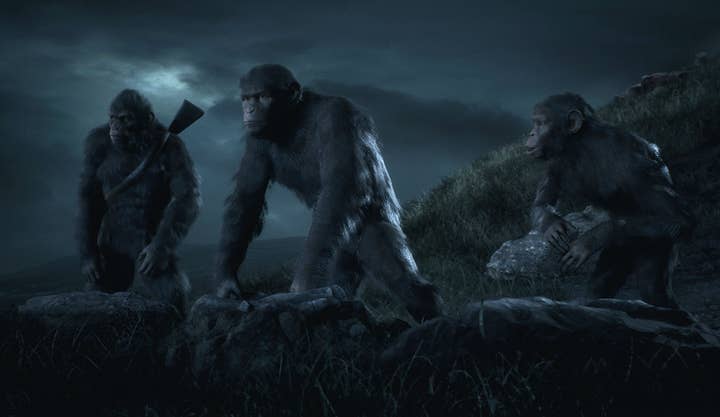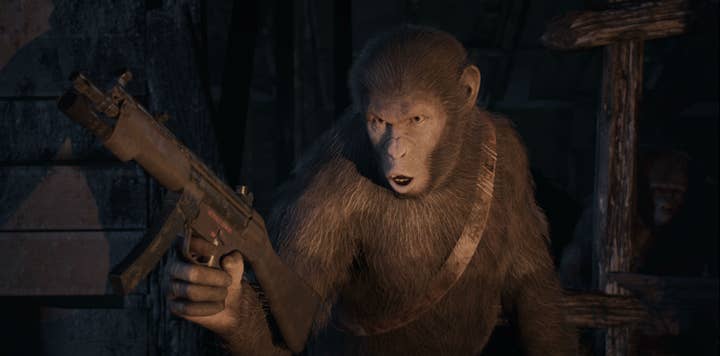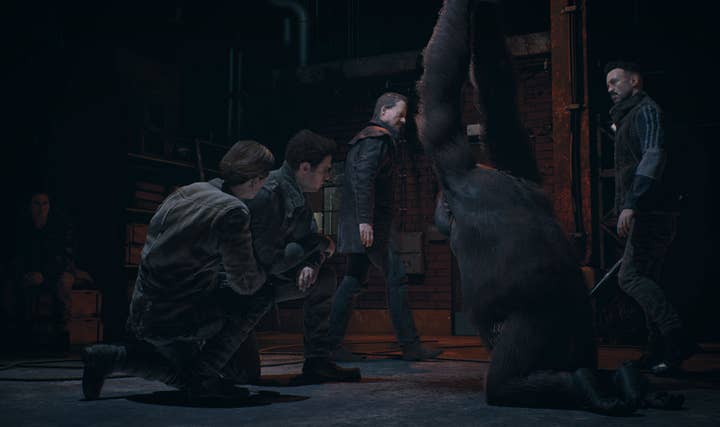How Planet of the Apes is using console gamers to reach its real audience
The Imaginati's Martin Alltimes talks us through the unusual business model behind narrative adventure spin-off Last Frontier
When you first hear a Planet of the Apes game is in the works, you'd be forgiven for assuming it's a third-person action game that ultimately culminates with you galloping around a battlefield as a dual-wielding chimpanzee.
Not so with Planet of the Apes: Last Frontier, which fashions itself as more of a narrative adventure, not unlike the output of Telltale Games or Quantic Dream. The title is being developed by The Imaginati, a games studio within Imaginarium: Andy Serkis' team of performance capture specialists that provide the monkey motions for the blockbuster films (not to mention almost everything else he works on).
Last Frontier tasks players with defining the story of both a tribe of apes and a pocket of human survivors, predominantly through a simple choice mechanic with the occasional quick time event. Given the films' increasing focus on action compared to the drama found in Dawn of the Planet of the Apes, you might think the action game you first imagined would be far less risky for the developer.

"Actually, I don't think it would," Martin Alltimes, CEO and founder of The Imaginati, tells GamesIndustry.biz. "If you think about The Walking Dead as a franchise, the Telltale title basically helped us justify people putting money into this.
"No one in any company I know would have ever greenlit that game as a narrative-based adventure. They'd have said no one wants to play that, it's boring, people want to take a bunch of weapons and shoot zombies. It's not that this isn't necessarily true, because zombie shooters are very popular, but it also demonstrates there's this view of how things should be done, which used to be limited to what big publishers thought consumers wanted. If you look at the sales for Telltale's Walking Dead and for Activision's shooter based on the series and I think you get your answer."
The other important factor here is that, yes, controlling a trigger-happy gorilla would appeal to the majority of traditional gamers - but that's not the audience The Imaginati wants. Instead, the aim has been to craft something that appeals to fans of the film, or even movies as a medium, making something that a much wider demographic can digest and enjoy.
"Because it's a format that's approachable, it's a cinematic experience and the interface is simple, I think we're going to attract a lot of partners, young kids playing with their parents and maybe even some grandparents," Alltimes explains. "It's a way of broadening the audience and making everything much more accessible. That was really the goal."
"Telltale's The Walking Dead basically helped us justify people putting money into this"
The key is ensuring as many people can experience the entirety of Last Frontier as possible, and crucial to that has been its length. The team is aiming for something that's just two to three hours long - similar to a film. The theory is that players will be able to work through the story in a single session, much the same they would when sitting down to a movie together. Even if three hours isn't practical for certain users, the story has been split into half-hour chapters that should be more conducive to people's schedules.
"It was important for us to encourage replayability," he says. "By keeping the game length short, it actually encourages you [to keep playing]. It's more achievable to go and play the experience over and over again, and to play it with different people. Not everyone has the time to play these massive games.
"The sort of people who are hopefully going to play this game with are people that you're going to introduce to console experiences that have never played a game before. They might come around for an evening and watch a movie with you, but they're not going to keep coming round to watch a 40-hour RPG."
While The Imaginati is aiming for a cinematic experience, there is no question that this is still a video game. As Alltimes observes, "No matter how good a movie is, you cannot change the outcome", but with Planet of the Apes: Last Frontier, that's exactly what audiences will be able to do.

The game offers multiple endings, dictated by the choices players make. While that's nothing new to the world of video games, it could prove to be enticing for the broader, less game-savvy audience Alltimes and his team hope to attract. And the shorter length means they'll be able to explore the possibilities that multiple endings afford.
"If you look at the games Quantic Dream makes, or even things like Until Dawn, investing ten hours in them means you're probably not going to replay it," says Alltimes. "The stats prove that. But by making it movie-length, it's something that can fit into someone's normal everyday lifestyle."
"People might come around for an evening and watch a movie with you, but they're not going to keep coming round to watch a 40-hour RPG"
The short nature of the game, and the broader audience he is aiming for has also dictated the pricing and method of release. Planet of the Apes: Last Frontier will be released as a digital only game for Xbox One, PS4 and PC, with a much lower price point than the typical $60 blockbuster. Again, it emphasises how odd a proposition this might seem, given that Planet of the Apes is arguably a blockbuster Hollywood franchise.
"We want to get to the widest audience possible," says Alltime. "And, frankly, retail to me is like a secondary market today. Everything's going digital. Why would I want to release something at retail? I'll only limit my potential audience."
Perhaps so, but we would argue that retail will give Last Frontier the visibility it needs to reach its intended audience. Partners and grandparents won't be browsing Steam or the PlayStation Store, but they might notice a Planet of the Apes game box when perusing the DVD aisle at Tesco.
"I suppose there's a point to that," Alltimes concedes. "I just don't think retail's quite geared up for this experience quite yet. I may be proved wrong, and if there's an opportunity to release this later at retail... The thing is about that person passing through Tesco, we're going to have to go through console owners to reach that audience. Console owners are the sort of people that are going to buy this initially and then tell their friends."

Last Frontier is currently scheduled for release around the time this year's War for the Planet of the Apes arrives on Blu-ray and DVD, so it's a safe bet there will be some marketing for the game around the film's launch.
However, Alltimes' words seems to suggest that the majority of the effort, at least on The Imaginati's part, is to target the console gamers to whom that broader demographic is connected. Essentially, the hope is to target a secondary audience and rely on evangelism to reach the primary one - indisputably an unusual model for the games industry, which has spent years forging channels directly to end users.
Alltimes reiterates that Last Frontier is still designed for traditional gamers as well: "This game looks like a high-end console game, and it's got innovations in it that will appeal to core gamers who like adventure games. They'll recommend it to their partners, and in some cases they might buy it specifically to play with them. If their friends come round, they might all play together and then the friends will go out and play it. It's just a different way of looking at it."
"If it were down to me, all I'd want to do is make PlayLink games and VR"
Of course, this still means The Imaginati are reliant on the presence of consoles in the living room (as opposed to the bedroom) to reach that broader audience. Fortunately, one version of Last Frontier will centre around a more ubiquitous device.
The PS4 edition will be part of Sony's new PlayLink range, a series of titles that use smartphones as controllers. Players tap the choice they want to make on their phone, meaning users who have never played a video game before have an interface and controller they're already comfortable with. "Sony's strategy is to create this range of content that can be played by anyone in their living room using their mobile phone," says Alltimes, predicting: "Eventually there'll be people who wouldn't normally buy a console that will because there's enough of this stuff out there that they can play. That's how Sony hopes to break out of the 60m-plus range. That's why PlayLink is a range strategy rather than a product strategy."
Planet of the Apes is by far the biggest title to be announced for the range to date, which so far has included mini-games collections and trivia contests, as well as crime thriller Hidden Agenda by Supermassive Games, which follows a similar format to Last Frontier. Alltimes is particularly excited to be not only part of the range but also, from a brand awareness perspective, headlining it.
"I had a conversation with [Sony Worldwide Studios SVP] Michael Denny the other day, and I said if it were down to me, all I'd want to do is make PlayLink games and VR," he says. "I think those are the two most interesting aspects of gameplay right now.
"Creating narrative interactive storytelling is what we're all about and I think one opportunity to explore that and expand the audience in completely different ways are these PlayLink games. We're super excited, and we feel really lucky. But also, the fact that we're able to have an interface that anyone can use massively increases the potential audience for us. We designed for multiplayer from the start, and it is on Xbox and it will be on PC, but there's no doubt the ace in the hole is mobile."

When playing with multiple people, the choice that gets the most votes dictates the action going forward. In the event of a draw, quick-fingered users have a limited number of 'overrule' tokens to use, but Alltimes hopes that tiebreakers will actually get groups discussing the choice and trying to convince each other on the best way forward.
"When you watch a normal movie the debate happens after you've watched it. With our game, the debate happens while you play"
"It breaks the fourth wall," he says. "When you play with other people, there is some magic that happens because we are social animals. It adds an X factor to the whole experience. Just being able to look at someone and... we play the game all the time, and we know we can make douche choices - it's fun to do that, because then your teammates are like 'why did you do that? Don't you realise...?'
"On the couch experiences used to be a big part of console gaming, and they've kind of disappeared. It reminded us how compelling it was to play a game on a couch with other people. Also, when you watch a normal movie the debate happens after you've watched it. With our game, the debate happens while you play."
An unusual business model and marketing strategy. A less than predictable use of the licence. The complete lack of a retail presence. There's no denying that Planet of the Apes: Last Frontier is a risky proposition for Andy Serkis' Imaginarium, which is ultimately footing the bill. But Alltimes remains confident that, like Telltale's gamble with The Walking Dead, this will pay off.
"When we looked at what was possible with our original test, we knew we could do something amazing. The Imaginarium bet the ranch on this thing - this is the cost of an independent British film. It needs to do well, but when we went into it, we knew that if we just copied what everyone else was doing it would be perceived less favourably than if we do what our heart tells us to do. We've got to make these things feel like movies not just for the sake of it, but because it will enable us to play with other people. What Sony are doing [with PlayLink] gives me hope. Those sort of companies don't get involved in these sort of things unless they've done a lot of research.
"I really want to use this as a basis to build on, but part of the reason we arrived here is we challenged the fundamentals of what works and what doesn't work in these games. You have to continually do that, and there are so many different ways you can explore this genre. We never built this thing knowing we could use mobile, but now that we can there's a whole bunch of interesting things we can explore."
